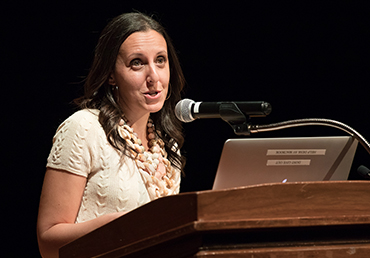 On November 8, Dr. Carla Shalaby, Research Specialist at the University of Michigan and author of Troublemakers: Lessons in Freedom From Young Children at School, delivered a presentation titled “On a Curriculum of Human Being: Learning Love, Freedom, and Troublemaking From and With Children.” Her speech was part of the Niemeyer Series, an annual forum held at Bank Street that examines contemporary issues in education.
On November 8, Dr. Carla Shalaby, Research Specialist at the University of Michigan and author of Troublemakers: Lessons in Freedom From Young Children at School, delivered a presentation titled “On a Curriculum of Human Being: Learning Love, Freedom, and Troublemaking From and With Children.” Her speech was part of the Niemeyer Series, an annual forum held at Bank Street that examines contemporary issues in education.
For her Niemeyer lecture, Shalaby, whose research centers on cultivating and documenting daily classroom work that protects the dignity of every child and honors young people’s rights to expression and self-determination, asked teachers to look to the troublemakers in their classrooms as those who can teach us the most about freedom, safety, and inclusion.
“On an average school day across this country, 250 preschoolers are suspended or expelled,” Shalaby said. “I worry about what happens to those 250 young, brilliant children. I worry about how they will come to see themselves as dangerous, too bad, or too broken to deserve a chance at belonging. And when we are told that a community is safer or better or easier or happier without them, I also worry about the thousands of children who bear witness to these lessons and throw away people. What are we teaching?”
Even in the most progressive classrooms, she noted, educators tend toward classroom management techniques that mimic the logic of prisons. Rather than police a set of rules to which students must comply or else find themselves socially isolated, Shalaby encouraged the teachers in the audience to learn from the troublemakers. “They are like canaries in a coal mine who suffer and warn the rest of us that something is wrong,” she said. “Instead of asking why a child is being so disruptive, I can instead ask: What is this child working so hard to disrupt?”
Shalaby asked teachers to be radical in their approach, in their inclusion, and in their love for their students. She argued for a definition of freedom that sets standards for behavior for all members of a classroom community, saying, “Freedom is a very high standard for classroom management. It isn’t 30 people all doing whatever they want, it’s every person wondering and worrying about how to make sure other members of their community are able to be their whole human selves. If I’m oriented toward ensuring that right to freedom for someone else, then that requires me to seriously mind my own actions.”
“Education can be a powerful force in the creation of a more rational, humane world,” noted Shael Polakow Suransky, GSE ’00, President of Bank Street College. “Shalaby’s work inspires difficult discussions about whether or not our schools are aggressive. She has pushed us to rethink our practices in deep ways.”
Shalaby’s presentation concluded not with answers, but with a request that teachers shift perspective and ask a different set of questions, including: “Is there a human need going unmet that this child is making visible? Is there a warning to heed? Can we wonder together how the problem in our classroom might be related to a problem we see out in the world? How will we practice healing one another and disrupting the harms we see out in the world?”
The John H. Niemeyer Series comprises lectures and symposia focused on urgent matters of educational interest. The Series is dedicated to the memory of John H. Niemeyer, Bank Street’s second president, for his leadership in helping Bank Street College become a national voice for children beyond practice and into policy.